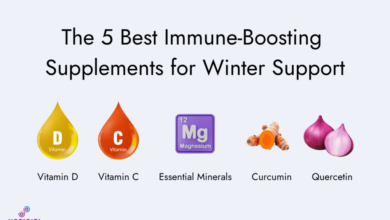How to Choose Immune Support Supplements: A Practical Guide

Your immune system is your body’s frontline defense. Supporting it through diet and lifestyle is essential but sometimes, especially during stress or seasonal changes, nutritional supplements can help fill in the gaps. Here’s a step‑by‑step guide on how to choose dietary supplements or children’s vitamins to strengthen your immune support.
1. Assess Your Needs First
Before picking any supplement, you should assess your personal or your child’s nutritional needs. Consider factors like age, diet quality, health status, and lifestyle. Do you eat a wide variety of fruits, vegetables, and lean protein? Do you have known deficiencies or health conditions? Tracking your food intake for a week or talking with a healthcare professional can help identify weak spots.
For children, it’s even more important: balanced meals, growth phases, and developmental needs all influence which vitamins or minerals may be beneficial. A pediatrician can guide you to the right formulation, dosage, and frequency.
2. Learn Key Ingredients for Immune Support
When looking at immune support supplements, focus on ingredients that truly support immune function:
- Vitamin C and zinc are the most common for immunity.
- Vitamin D plays a critical role in immune regulation.
- B‑complex vitamins help with overall energy and immune resilience.
- Antioxidants like selenium, and herbal support like echinacea or elderberry, may also help.
Check labels for forms that are bioavailable (e.g., zinc citrate or picolinate, vitamin D3 vs D2) and avoid megadoses unless recommended by a practitioner.
Do I Need to Take Vitamins When Eating Properly?
If you are already eating a balanced and varied diet, you might wonder: “Do I actually need supplements?” The short answer is: maybe not, but it depends.
Eating properly—meaning a diet rich in vegetables, fruits, whole grains, lean proteins, nuts, and healthy fats—gives you a strong nutritional foundation. However, due to modern life, you may experience:
- Gaps in your diet because of busy schedules or limited food variety
- Seasonal deficits (for example, less fresh produce or less sun exposure in winter)
- Higher demands during stress, illness, or growth phases (in children)
Supplements can serve as an insurance policy, especially when your diet alone may not provide optimal levels of immune‑supporting micronutrients. But remember: supplements do not replace healthy eating. They are designed to support—not substitute—real, nutrient-dense food.
See also: Modern Approaches to Injection Devices in Healthcare
How to Choose a Solid Foundation Supplement Plan
By “foundation,” we mean the core daily supplements that will consistently support your immune health, rather than taking high-dose “rescue” pills only when you feel run down. Here’s how to choose the right foundation:
Pick by Purpose
- For general immune maintenance, a multivitamin or immune‑support blend often works best.
- If you already have low vitamin D or frequent illness, choose something targeted for those needs.
For children, look for chewables, gummies, or liquid forms that are safe and easy to take.
Quality Matters
- Choose reputable brands that use third-party testing for purity and potency.
Look for GMP-certified manufacturers, and transparent labeling (you should be able to see exactly how much of each nutrient is in the product).
Dose Wisely
- A foundation supplement doesn’t need to provide megadoses; more is not always better.
- Start with moderate, research-supported levels of key nutrients like vitamin C (e.g., 100–250 mg), vitamin D (e.g., 400–2,000 IU depending on your situation), and zinc (e.g., 5–15 mg).
Avoid combining multiple high-dose supplements without medical supervision.
Check for Synergies and Red Flags- Some nutrients work better together (e.g., vitamin D and magnesium, or vitamin C improving iron absorption).
Be careful about interactions: too much zinc can interfere with copper absorption, and large amounts of certain antioxidants may conflict with medications. Always consult a healthcare provider if you take prescription drugs.
Consistency is Key- A daily routine matters more than occasional “mega‑dosing.”
Take your foundation supplement at a time you’ll remember (morning with breakfast, perhaps), and track how you feel over weeks rather than days.
If you’re looking for a trusted source for immune support supplements, you might consider checking out the Amway immune support range. For detailed information and options tailored to immune health, you can explore this link: Amway Immune Support Supplements.
Final Thoughts
Supporting your immune system is about more than just popping a pill. While a good diet lays the groundwork, carefully chosen supplements can boost your defenses when needed. To choose wisely:
- Assess your or your child’s real nutritional needs
- Understand the key immune‑supporting nutrients
- Ask whether supplements are needed even if you “eat well”
- Build a foundation supplement plan based on quality, purpose, and safety
- Be consistent, monitor results, and adjust as necessary
When done right, immune support via supplements is a balanced, thoughtful complement to a healthy lifestyle—not a shortcut. Use reliable sources, and don’t hesitate to talk to a qualified health professional when in doubt. With the right approach, you can confidently choose supplements that support your health, not complicate it.





